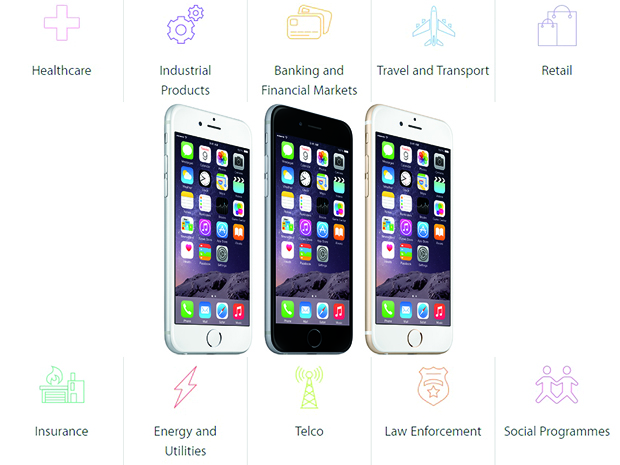iPhone in the enterprise: Apple's ecosystem is the secret to its success


In 2007, Apple ran television ads with pilots and other business types explaining how useful its new smartphone was for accessing email or browsing the web. It's sometimes easy to forget how revolutionary the iPhone was when it was released -- it was one of the first phones to forgo the physical keyboard (causing much consternation among BlackBerry aficionados who didn't want to give up that feature), and there were many skeptics who thought the device would be a flop.
These days, the iPhone accounts for 69 percent of Apple's revenue, and the company has sold more than 200 million smartphones in the past year. And, largely thanks to the iPhone, Apple is stronger in the enterprise than it has ever been.
iPads and iPhones at the office
For years, Apple has primarily been a consumer-focused company. Much of the company's marketing was aimed at selling iMacs and iPods to consumers. Apple sold plenty of Macs to schools and graphic design shops, but there was not a massive enterprise push.
The iPhone and iPad changed all that. Within just a couple years of launch, both devices moved into the enterprise in a big way, thanks primarily to large corporate purchases through carriers, as well as employee and executive demand. In a 2015 Tech Pro Research survey, 84 percent of respondents said their companies had adopted Apple products to give increased platform choice to employees or because employees or executives had asked for it.
Now, with these mobile devices, all of a sudden Apple was a player in the enterprise game. And it happened in a somewhat backdoor way. By largely focusing on consumers, with the ability to use the phone for work email as an added benefit, Apple took advantage of the burgeoning bring-your-own-device (BYOD) trend to make inroads in the enterprise.
Apple has had an internal enterprise sales team for years, though it was never a particularly large part of Apple's sales strategy. Many companies have purchased iPhones and iPads through carriers like AT&T and Verizon, although direct purchases through Apple are increasing.
Billions on Apple ecosystem pay off
Sales aside, Apple's biggest strength is its ecosystem. The company has spent billions building the App and iTunes Stores, as well as its cloud storage service, iCloud. Launched a few years back, iCloud now allows users to seamlessly back up their devices to Apple's data centers. In some ways, it's an Apple version of Microsoft Exchange that's included free with every Apple device.
iCloud users see their contacts and calendars seamlessly sync between all their devices (Mac, iPhone and iPad) just by logging in with an Apple ID (which is also used to purchase apps and music from Apple's digital stores). It didn't always work seamlessly, but these days iCloud works very well.
For smaller companies that don't want to invest in the IT infrastructure for an Exchange server, for example, or for larger companies with unsupported BYOD programs, iCloud makes it easy for corporate iPhone users to keep their data safe.
iCloud has the added benefit of allowing customers to remotely lock, locate, or erase their phones if they are lost or stolen; the automatic backup function allows users to be back up and running very quickly once they get a new phone. The usefulness of this feature cannot be underestimated, as anyone who has ever lost a phone and then spent hours rebuilding their digital life will tell you.
Then there's the App Store, which includes a huge variety of the high-quality mobile apps.
Competitors in the mobile market
Traditionally, Apple competed with other PC manufacturers such as Dell or HP. But these days, since those companies don't really compete in the mobile space (instead selling lower-cost PCs or data center equipment that Apple doesn't offer), Apple's competition has changed significantly.
Apple is competing with Google and Amazon on services, including app, music, and book stores. Google and Microsoft make competing smartphone and tablet operating systems. Microsoft and Samsung are Apple's biggest competition in mobile hardware.
According to a Good Technology report published earlier this year, iOS accounts for nearly three-quarters of activated smartphones in companies using Good's enterprise mobility products. Android accounted for 25 percent, with Windows Phone and other platforms accounting for just 2 percent combined.
Because Apple's mobile devices account for so much of its sales volume -- the iPhone and iPad account for a combined 78 percent of Apple's total revenue -- its much smaller Mac market share doesn't matter as much. Even though many old-school folks might still think of Apple primarily as a computer company, make no mistake: Apple is a smartphone maker first and foremost. And, at least in the mobile-focused parts of the enterprise, it appears to be blowing away the competition.
IT benefits and challenges of Apple in the enterprise
Apple makes a number of products to help IT departments manage their devices, including a recently updated mobile device management framework. The framework allows companies to manage and secure data, install App Store and in-house enterprise apps, and keep personal apps and data separate from corporate-sensitive apps. Features like per-app VPN and extensive privacy functions protect the company and the employee from overreaching actions.
There are extensive settings for BYOD and corporate-owned devices, giving larger or smaller amounts of control depending on the situation. Companies can even buy devices direct from Apple or select third-party resellers and carriers that are already enrolled in Apple's device management program.
The main problem with Apple's setup is that it is one more thing for IT departments to learn about and deploy. Many companies are looking for unified deployment programs like the one from the aforementioned Good Technology, or dozens of other companies.
For companies already using a device management suite for PCs or non-Apple devices, they may be able to keep using that for their Apple products as well. But, given how far Apple's internal device management has come (and its for-better-or-worse closed ecosystem), IT departments may find Apple's MDM tools to be the best route, even if it takes longer to train staff on how to set it all up.
Conclusion
Apple will stay in the enterprise for the foreseeable future. It makes sense for businesses to take advantage of the parts of the Apple ecosystem that make everyone's lives easier.